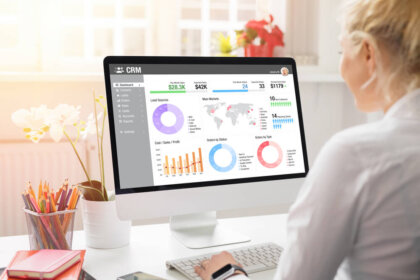
In today’s digital world, businesses need to be able to adapt to the ever-changing landscape. This means being able to provide customers with a seamless experience, regardless of how they choose to interact with your business.
One way to do this is to move your business to a digital mode. This means using technology to automate tasks, provide customer service, and market your products or services.
What is a CRM software?
A Customer Relationship Management (CRM) is a smart CRM platform that offers a wide range of features and modules to help businesses of all sizes manage their sales operations more effectively. It can be used to track leads, manage sales, and provide customer support. It can also help businesses improve their efficiency and reduce costs.
Benefits of using a CRM software?
Here are the benefits of switching to a CRM software:
- Organized and systematic information storage and retrieval
- Faster lead tracking with an automated task management system
- Automated reports and metric generation
- Improved staff performance
- Seamless scalability and backup
- Overall business cost reduction
It is important to note that not all CRM are created equal. Some CRM are better than others at reducing business costs. When choosing a CRM, it is important to consider your specific needs and requirements.
Here are 8 ways CRM platform can help reduce costs for your business:
- Improved customer service
CRM can help businesses improve customer service by providing a centralized repository for customer data. This data can be used to track customer interactions, identify customer pain points, and develop targeted solutions. By improving customer service, businesses can reduce the cost of customer churn and increase customer lifetime value
- Increased sales
CRM can help businesses increase sales by providing a more efficient sales process. CRM can help sales teams track leads, manage opportunities, and close deals. By streamlining the sales process, businesses can increase the number of deals they close and the amount of revenue they generate.
- Reduced marketing costs.
CRM can help businesses reduce marketing costs by providing a more targeted marketing approach. CRM can help businesses track customer behavior, identify target audiences, and create personalized marketing campaigns. By targeting their marketing efforts more effectively, businesses can reduce the amount of money they spend on marketing and advertising.
- Improved efficiency
CRM can help businesses improve efficiency by automating many of the manual tasks involved in running a business. CRM can automate tasks such as lead generation, customer support, and sales forecasting. By automating these tasks, businesses can free up their employees to focus on more strategic activities.
- Reduced errors.
CRM can help businesses reduce errors by providing a single source of truth for customer data. This data can be used to prevent errors in customer records, sales quotes, and invoices. By reducing errors, businesses can save money on costs associated with correcting errors.
- Improved decision-making.
CRM can help businesses improve decision-making by providing insights into customer behavior and trends. CRM can help businesses track customer interactions, identify customer pain points, and develop targeted solutions. By making better decisions, businesses can improve their bottom line.
- Increased compliance
CRM can help businesses increase compliance by providing a centralized repository for customer data. This data can be used to track customer interactions, identify customer preferences, and comply with regulations. By increasing compliance, businesses can avoid costly fines and penalties.
- Improved employee morale
CRM can help improve employee morale by providing a more efficient and productive work environment. CRM can help employees track their progress, collaborate with colleagues, and access information quickly and easily. By improving employee morale, businesses can reduce turnover and increase productivity.




